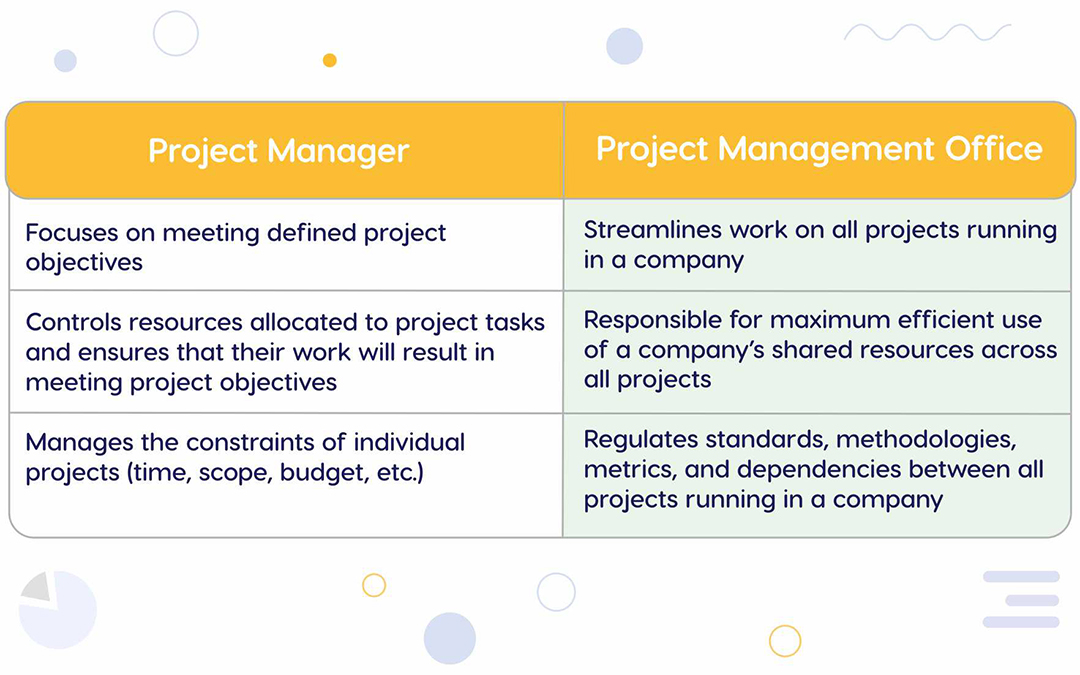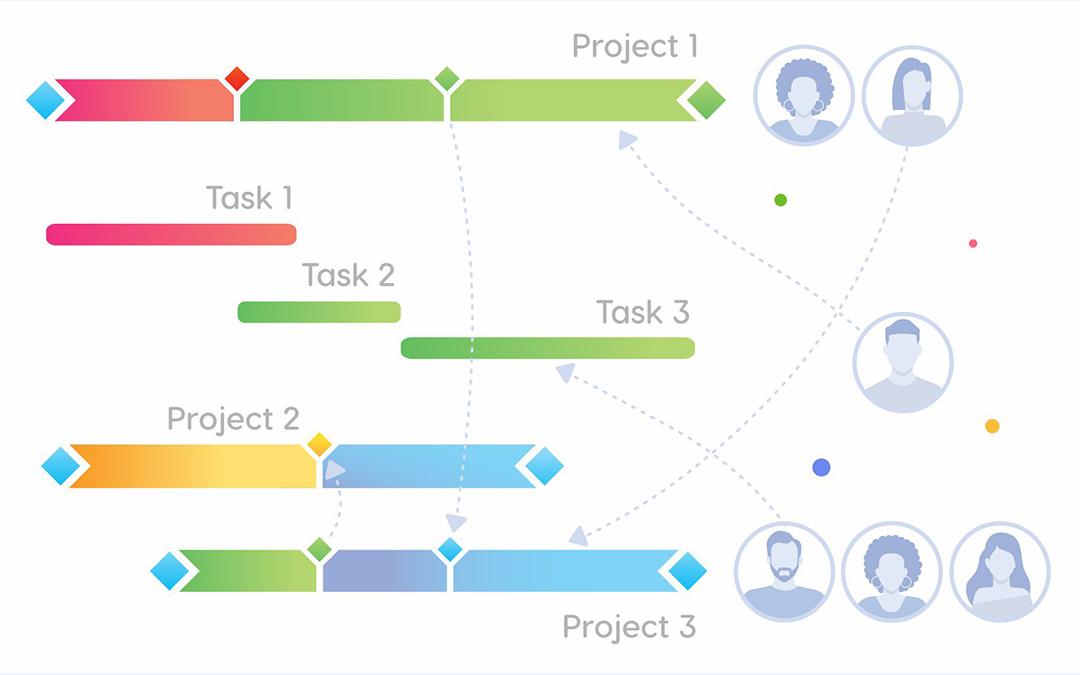As companies develop and grow, and the number of projects they deliver increases, business leaders are seeking ways to ensure more efficient coordination of all their initiatives. For this purpose, a great number of organizations started to set up a project management office (PMO) – according to the 2021 report on the state of project management [1], 82% of organizations reported to have one.
What functions does this department have in a company? How does it help deliver projects more successfully? Does every company need a project management office? Read further to find out answers to these and other essential questions about a PMO.
What is a PMO?
First, let’s note that the abbreviation “PMO” may refer to project, program, and portfolio management offices, each of them having their specific roles and serving specific purposes in a company. In this article, we’ll focus on the overview of a project management office only.
The concept of a project management office was defined in the Project Management Body of Knowledge [2]: it’s a department that establishes standards for processes related to managing projects and approves corresponding methodologies, techniques, and tools. It serves as a point of contact for all organization’s projects and is involved in management of shared project resources.
PMBOK distinguishes three types of PMOs depending on their impact on a company’s projects:
- Supportive PMOs have an advisory role in managing a company’s projects, which involves providing project managers with training, templates and other necessary materials, sharing best practices, etc. They have a low impact on projects’ workflows.
- Controlling PMOs not only provide the above-mentioned support, but also require compliance of the project management process with certain standards, e.g., frameworks, templates, tools, etc. They have a medium degree of control over projects’ processes.
- The members of directive PMOs manage a company’s projects themselves. So, the degree of control in this case is high.
Before we proceed to further description of a PMO, it’s important to mention that every project management office will be different depending on the size of a company, its business goals, stakeholder needs, industry, etc. We’ll provide the most general overview of this organizational department.
What are the functions of a project management office?
The main function of a project management office involves a comprehensive support of project managers. Basically, this support is implemented in the following ways.
- Establishing project management methodology, standards, and best practices.
In particular, a PMO іs responsible for developing common frameworks that are used by all project participants (team members, stakeholders, project managers) in their work on projects. In addition, a project management office provides all necessary project documentation (templates, policies, etc.).
- Making sure that a company’s projects are aligned with business objectives.
A PMO analyzes a company’s short- and long-term business objectives and helps businesses prioritize projects accordingly.
- Providing project managers with various kinds of supervision.
Training and mentoring project managers aims to make sure that they have necessary skills and expertise as well as understand essential methodology, techniques, and tools applied in work on particular projects.
- Managing shared resources across all projects.
Juggling a company’s numerous resources and ensuring that they are allocated in the most efficient way is a real challenge for a project manager alone if we speak about a multi-project environment. A PMO works with different departments and distributes their employees properly across all company’s projects.
- Facilitating communication and collaboration between teams.
For large projects, where people from several different departments are involved, it’s important to make sure that their efforts are properly coordinated. This is where a PMO can assist by becoming a liaison between them, facilitating their fruitful communication and collaboration.
What is a PMO’s staff?
Despite that each PMO is different depending on the industry, projects, and a company itself, we can distinguish some typical roles within a project management office.
- Head of a PMO / PMO director is a person responsible for establishing the project management standards and methodologies, managing other PMO staff, and overseeing the state of all projects running in a company.
- Project managers work on particular projects and ensure their successful completion.
- Project management trainers/coaches provide project managers with necessary support and facilitate their professional development.
Also, a PMO may include a software expert who provides assistance with implementation of project or resource management solutions.
What is the difference between a PMO’s and a project manager’s role?
Basically, a PMO has a wider area of responsibility in a company compared to a project manager. We’ll compare their roles in the table below.

To sum up, a project manager is responsible for successful delivery of a project, while a PMO ensures that all projects running in a company are properly managed and aligned with a company’s business objectives.
What are the benefits of having a PMO for a company?
An efficiently working PMO can provide your organization with the following benefits.
- Improved quality of project outcomes.
A PMO contributes to successful delivery of a company’s projects thanks to providing project managers with necessary assistance and facilitating fruitful collaboration between teams and departments.
- Cost reduction.
This is achieved thanks to maximum efficient utilization of the available resources, analyzing feasibility of intaking new initiatives, and facilitating on-time delivery of projects in the pipeline.
- Providing a single source of truth for all project data.
Standardization of project management processes and centralizing all necessary project information creates conditions for better visibility of all project-related operations, which in turn contributes to higher quality of project deliverables.
- Ensuring that a company runs the right projects.
A PMO analyzes real-time and historical data, business needs, and other indicators to choose projects that will correspond to a company’s business strategy to the full.
- Project risk mitigation.
As long as a PMO regularly monitors the state of all projects, they can timely spot potential risks to a project and suggest ways of responding to them. [3]
What companies need a project management office?
Certainly, establishing a PMO isn’t a must for every company that runs projects. However, if it deals with large costly initiatives in a high risk environment, a PMO will significantly increase the chances for project management efforts’ success. Also, if there are a number of concurrent projects running in an organization with a shared pool of resources, a PMO can ensure that these resources will be utilized in the most efficient way possible.
Does a PMO need resource management software?

Modern project and resource management solutions perfectly meet the needs of a project management office. According to the Wellingtone 2021 report on the state of project management, 57% of PMOs are going to increase their scope and responsibilities, while only 38% of them are planning to increase the headcount [1]. This means that they will look for ways to increase the efficiency of their work.
This is where the right project or resource management solution comes in handy. We’ll analyze Epicflow as an example: it’s a multi-project resource management solution, so it perfectly serves the needs of a large enterprise with a shared resource pool. Let’s consider how its functions intersect with the ones of a PMO and how the department can benefit from its functionality.
Managing an organization’s shared resources pool
Epicflow can efficiently assist in managing a company’s shared resources. This becomes possible thanks to two important functions:
- automatic AI-driven prioritization of tasks across all projects,
- a resource allocation advisor that suggests best possible resource allocation options based on the data on people’s competence levels, capacity, and availability.
Running simulations for improved decision-making
You can use Epicflow to assess feasibility of intaking a new project: its AI-powered scenario analysis allows you to predict various project outcomes based on the changes you make in your current project environment. As a result, it becomes a perfect assistant in informed decision-making (e.g., if it’s necessary to decide whether it’s feasible to intake a new project or you need to take certain actions to improve the workflow).
Spotting potential problems
With Epicflow, you can quickly and easily detect potential problems: its graphs provide a comprehensive idea of current or future bottlenecks, so that a project/resource manager can take timely measures to resolve them.
Centralizing all project-related data
Epicflow keeps all necessary project data and therefore provides a single source of truth for all project participants: from each team member to a project/resource manager and project stakeholders.
Automatic report generation
One of the responsibilities of a PMO is to create and analyze reports on the state of projects in the pipeline. With Epicflow, you can automatically generate reports that provide relevant data within a defined time period (current or previous month). So, PMO members don’t have to spend time on gathering necessary data and compiling these documents manually – Epicflow will do this for them.
Therefore, thanks to the right approach to managing multiple projects and their shared resources, Epicflow gets the best of two worlds: on the one hand, it significantly increases the efficiency of the workflow and the quality of the final outcome; on the other hand, it provides a great assistance to a PMO by simplifying their work.
To learn more about Epicflow’s capabilities to efficiently manage a complex multi-project environment and its resources, please, contact our specialist and book a consultation.
Conclusion
A PMO is a department that deals with an overall support of the project management processes, namely:
- establishing standards and methodologies to effectively manage all projects running in a company,
- providing project managers with necessary training and supervision,
- managing a company’s shared resources,
- streamlining collaboration between project teams and departments.
A project management office isn’t a must for every company. However, large and fast-growing ones that manage multiple projects with shared resources can significantly increase the efficiency of their project management efforts with a PMO, especially in combination with the right resource management solution. In addition, a project management office contributes to cost reduction, more efficient risk management, improved quality of project outcomes, and overall business results.
References
- Wellingtone. (2021). Annual Report. The State of Project Management. Retrieved from: https://wellingtone.co.uk/wp-content/uploads/2021/03/The-State-of-PM-2021.pdf
- A Guide to the Project Management Body of Knowledge. 5th Edition.
- 10 Important Benefits of a PMO (Project Management Office). (2021). Retrieved from: https://www.indeed.com/career-advice/career-development/benefits-of-pmo

